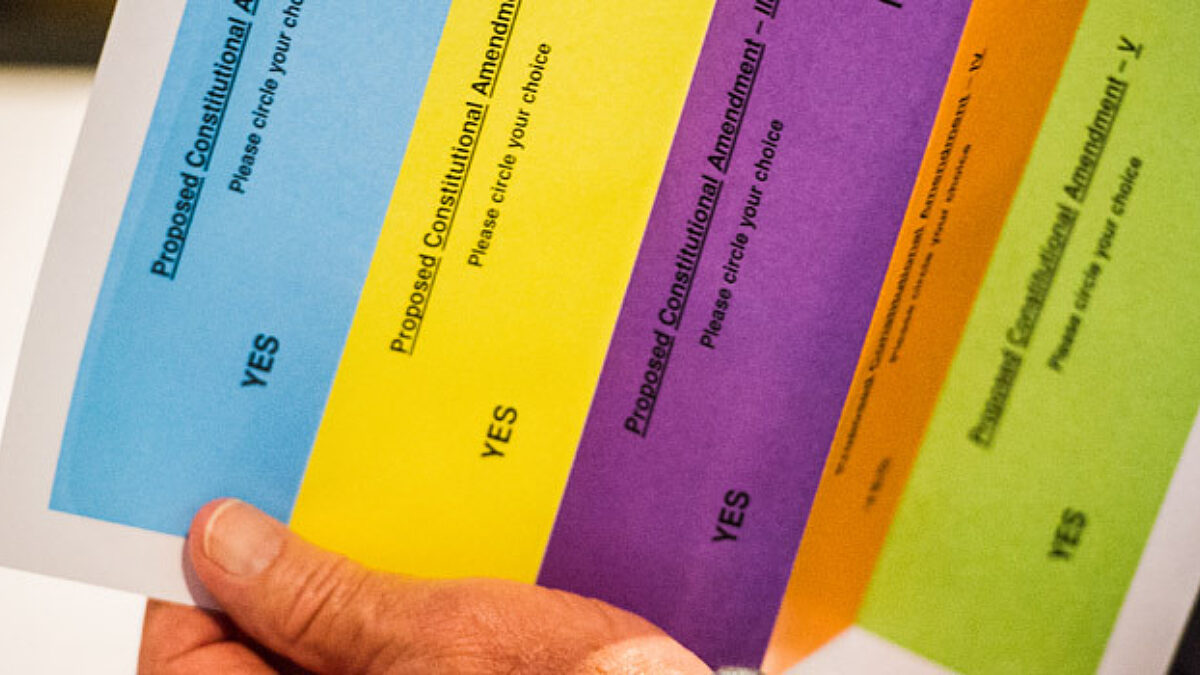
AC2017 votes on constitutional amendments, but results to be kept quiet until all UMC votes cast
By Jessica Brodie
GREENVILLE—South Carolina laity and clergy had the chance to vote yesterday on five amendments to the constitution of The United Methodist Church, but results of the vote will not be released until all annual and central conferences throughout the denomination have voted.
That is the word from Conference Secretary the Rev. Ken Nelson, who said the UMC’s Council of Bishops asked every conference to forward their results to the general church but keep those results secret so as not to influence voting.
“Just like in presidential elections, every jurisdiction is different, every annual conference is different, and if votes are put out there early, it has the chance to shape how other conferences vote one way or the other,” Nelson said.
The body voted Tuesday morning on the amendments, which passed at the UMC’s General Conference 2016 and are currently going before all annual and central conferences. The language of the amendments cannot be altered, and they will be ratified pending majority vote by the conferences.
Amendment I adds a new paragraph between current Para. 5 and 6 in the 2012 Book of Discipline regarding gender justice. The rationale notes that the constitution contains a paragraph on racial justice but not one on gender justice.
Amendment II changes Para. 4, Article IV, of the Discipline also to modify gender equity language. The rationale notes that adding gender to the Constitution affirms and protects the UMC’s commitment to gender equity throughout our worldwide connection, plus allows gender-specific groups like United Methodist Women and United Methodist Men.
Amendment III attempts to fix what the rationale calls “unduly vague” language in Section VI, Para. 34, Article III, of the Discipline, with language about delegates to General Conference needing to be elected (not appointed).
Amendment IV adds language to Para. 46, Article I, of the Discipline about episcopal elections being held in the same manner for central conferences as in jurisdictions.
And Amendment V adds a new sentence to the end of Para. 50, Article VI, of the Discipline enabling the COB to hold its individual members accountable for their work.
The last three amendments were voted upon with no discussion, but the first two brought some debate on the floor.
Amendment I, rooted in gender justice, saw three speeches for and three against it. Some took exception with the idea of male and female images of God.
Evelyn Johnsey, of Trinity UMC, York, spoke against the amendment, asking how it is contrary to scripture and to logic to take away “father” from God.
“Jesus told us to pray, ‘Our Father, who art in heaven,’” Johnsey said.
Also speaking against the amendment was Michael Cheatham, who said the wording of the amendment seems more appropriate to the UMC’s Social Principles or the Book of Resolutions rather than in the Constitution. And Rod Belsky said that while he never wants to see any woman or girl ever considered “less than him” because of gender, changing the Constitution this way makes Christianity even more secular than it is Christian.
“We’ve already changed lyrics in the hymnal,” Belsky said. “I assume now eventually we’re going to want to change the Lord’s Prayer to say, ‘Our Parent, who art in heaven.’”
But in speaking for the amendment, the Rev. Carol Cannon, pastor of St. Andrews UMC, Orangeburg, said, “I do not believe this says we cannot call God ‘father.’ What this says is God is beyond gender.”
Cannon said in Luke 15 God is presented in varying images: as a shepherd, as a father and as a woman looking diligently for her lost coin.
“Jesus our lord shows God is beyond gender—God is neither male nor female, Cannon said, noting those images are how we understand how God made each of us in God’s own image.
The Rev. Fran Connell, pastor of Brookland UMC, West Columbia, said it is clear historic fact that throughout the millennia, men have used imagery for God as male specifically for the purpose of oppressing women and girls.
“We know better, and the Scripture teaches us better,” Connell said. “As Rev. Cannon stated so eloquently, there are many images in the Bible of God, not only as male or female but as God without gender, as a rock or as the silence after the wind.”
Dorothy Turbeville, of the Jordan Charge in Manning, agreed, noting, “God is all genders. If you read this amendment carefully, it doesn’t say we’re going to take ‘father’ out of the Bible or changing the Bible at all, just changing the Constitution to make women more equal.”
Amendment II, also about gender justice, prompted debate, as well. Jessie Patterson, of Trenholm Road UMC, Columbia, said she feels the amendment is too vague. Given that the traditional definition of marriage is in question, she said, “It is prematurely and irresponsibly written.”
The Rev. Jeremy Howell also spoke against the amendment, noting he fears unintended consequences because it notes the UMC will not discriminate based on ability instead of barring discrimination based on disability.
However, speaking for the amendment, the Rev. Rosetta Ross, Hartsville District, said in the affirmation of scripture it says “God welcome whosoever will.”
“I hope that as un meth we will welcome whosoever,” she said.
Also speaking for the amendment, the Rev. Jim Morgan, Anderson District, said sometimes we have a temptation to make every issue about every issue.
“Sometimes votes become sort of proxy votes for the things we want to fight about, which I think perhaps says more about our desire to fight one another,” Morgan said. “I see this amendment as wanting to affirm what is already mainstream practice: we do not discriminate.”
The Advocate will cover results of the votes as soon as they are made available.